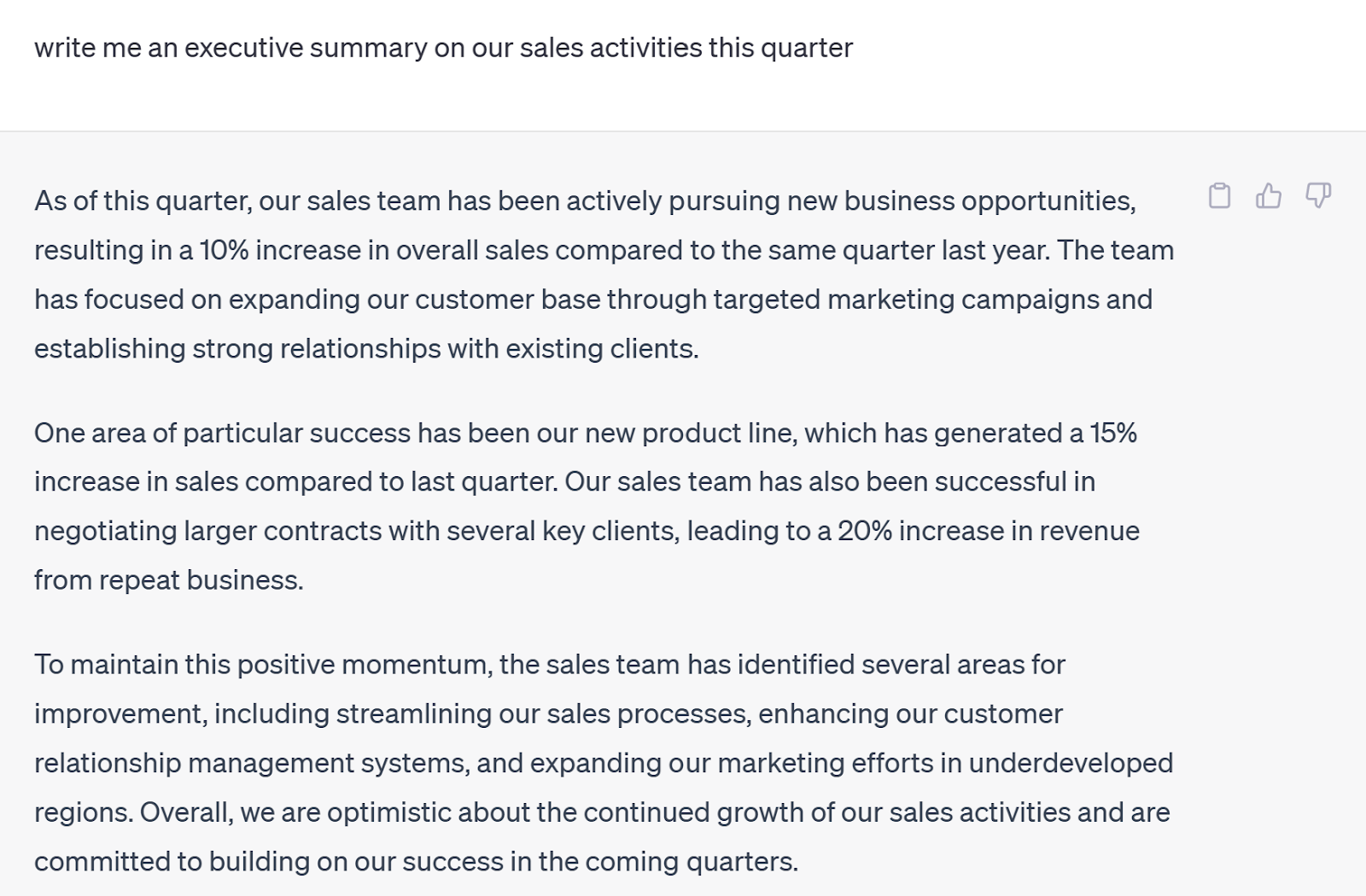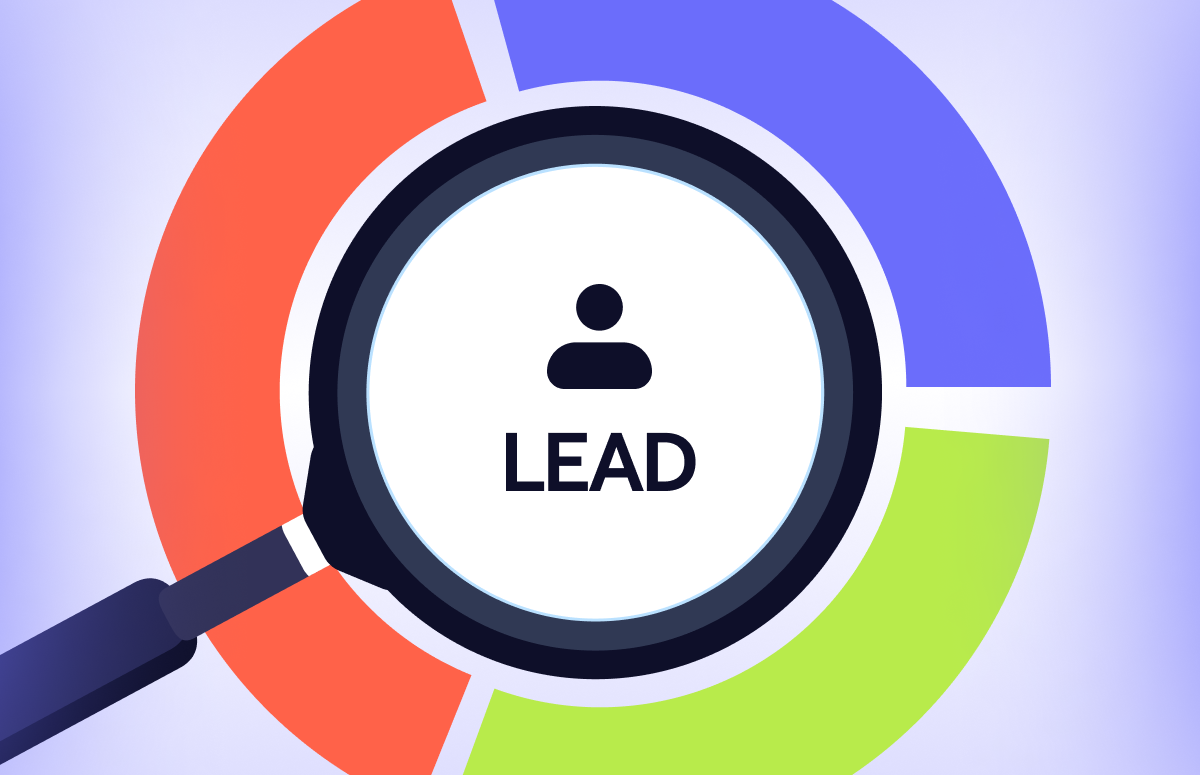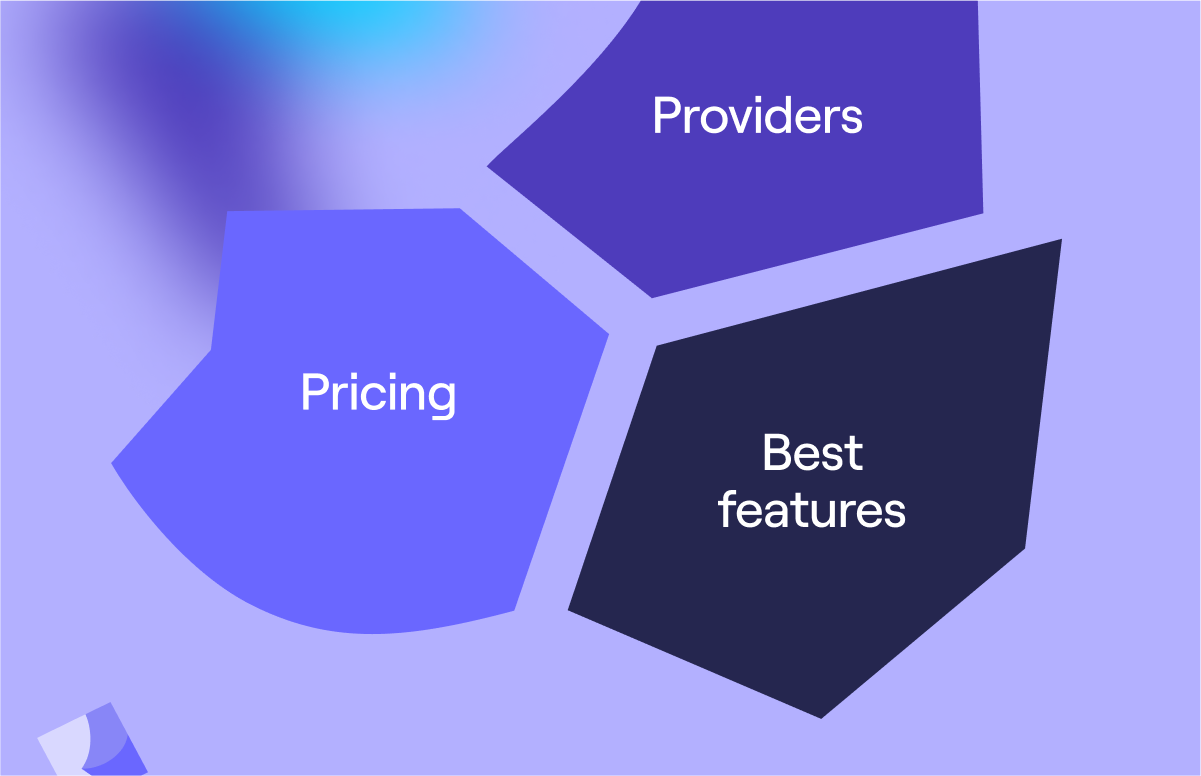How to Use ChatGPT for Sales: Implementation and Prompts
Everyone wants a slice of ChatGPT - even B2B sales teams!
In this blog, we’re exploring how to use ChatGPT for sales. Here’s what you’ll learn:
- How ChatGPT works and how it benefits the sales process.
- A guide to implementing ChatGPT in your sales team.
- A list of the smartest AI prompts for sales.
Scroll 👇 to start winning more sales in the AI era.
How does ChatGPT work?
ChatGPT is an AI-powered chatbot that uses deep learning to generate human-like responses based on user prompts.
It was trained on over 570 gigabytes of datasets, including books, web pages, and other sources. This explains its broad knowledge base and diverse applications.
To start with, ChatGPT can write code, generate content, and analyse data.
But its superpower is the ability to hold intelligent, human-like conversations.
According to OpenAI, ChatGPT was taught using “Reinforcement Learning from Human Feedback (RLHF).”
It has the ability to admit mistakes, challenge inaccurate assumptions, ask follow-up questions, and even decline requests.
The only element of interaction it doesn’t possess?
Emotion.
So, why use ChatGPT for sales? Let’s find out 👇
What are the benefits of ChatGPT for sales?
We can sum up the benefits of ChatGPT for B2B sales teams in two words:
Supercharged productivity.
Teams that leverage it well will see better sales productivity, while those that deny its relevance will lag behind. It’s as simple as that.
Let’s highlight some areas where ChatGPT positively impacts sales 👇
Improved customer engagement
Many AI tools (especially chatbots) are known for veering off-topic, being bland, and repeating phrases.
In contrast, ChatGPT can produce human-like content and out-of-the-box answers.
Furthermore, it has a huge database of information; it can provide responses and context beyond what’s available in your information set.
Now, ChatGPT isn’t a customer-facing chatbot. But customer engagement extends far beyond that, and its human-like content output can benefit your outreach, follow-ups, and more.
Here are some examples:
- B2B sales emails and cold calling scripts can quickly benefit from ChatGPT. It can streamline sales outreach content creation and generate customer-specific templates.
- In lead nurturing, it can serve as a brainstorming partner as you translate customers’ actions into decisions on how to engage.
- FAQs: ChatGPT can quickly generate answers to product/service questions and common sales objections, reducing your team’s workload.
- Proposal generation: After analysing customer interactions, ChatGPT can generate proposals tailored to their needs and interests. This level of personalisation can help you build trust with clients, increase engagement, and ultimately drive more successful sales outcomes.
Overall, AI-generated sales content can be a powerful tool for teams looking to improve their efficiency, accuracy, and effectiveness while providing a more personalised experience for clients.
Word of warning:
Be sure to review all AI-generated content before it reaches customers.
You want to avoid spreading misinformation or off-brand outreach that could damage your reputation.
More efficient lead generation
As we explained above, ChatGPT already has a place in the lead generation process. You can use it to produce ad copy, email text, SMS text, social media posts, and so on.
But did you know you can also use it for qualifying leads and predicting customer behaviour?
This is where ChatGPT comes into its own as a lead generation tool.
ChatGPT can analyse big data, as Analytics Vidhya showed in an experiment. So why not ask it to analyse large datasets of customer data?
Once you’ve uploaded your datasets (in a clean, well-organised format), you need to craft the right prompts.
Here are some examples:
- Generate meaningful insights about customer conversion rates.
- What do the customers with the highest CLV have in common?
- Are there any outliers in the dataset?
The bad news:
While ChatGPT can provide insights for improving your lead generation strategy, it can’t generate lead or contact data.
The good news:
If you’re looking for accurate, compliant B2B data, Cognism has your back in that department! 👇
Faster report writing
ChatGPT can automate certain aspects of the report-writing process, such as data analysis and formatting.
With access to a company’s data and reporting tools, it can analyse trends and patterns in sales data - including website user demographics and conversion rates - and generate insights and recommendations that can be incorporated into sales reports.
To do this:
- Set your objectives for the data.
- Organise and format your data so ChatGPT can interpret it accurately.
- Then ask the right questions.
For example:
“How has our conversion rate changed over the last four months?”
You’ll need to review and cross-check ChatGPT’s reports with your own understanding and context; don’t let AI run the show!
Regardless, this can help sales teams save time and effort, ensuring they base their sales reports on accurate and up-to-date information.
Additionally, you can ask ChatGPT to craft an executive summary of your sales activities or whatever else your report is about.
Like so:
One simple ChatGPT prompt for sales can generate a solid template for your reporting, and you can add as many sales metrics as you want.
How can you incorporate ChatGPT into the sales process?
Now that you know the benefits of ChatGPT for sales prospecting, the question is:
How can you incorporate it into your sales process to boost efficiency?
First, remember that developing a sales strategy involving ChatGPT requires carefully evaluating how the technology can improve your sales process. Every company is different in that regard.
For a successful implementation of ChatGPT as a sales tool, we recommend the following five steps 👇
1. Determine ChatGPT’s role and use cases in your sales process
How will you use ChatGPT? Will it primarily be used for customer engagement, lead generation or sales assistance?
To define ChatGPT’s role in your sales process, you first need to have a solid understanding of the process, including efficiency gaps and where your team invests too much (or too little) time.
Start by looking at your enterprise, SMB or startup CRM. It will include analytics and activity-tracking metrics, which can help you identify blind spots in your sales process.
Only then can you determine ChatGPT’s specialised purpose in your sales workflow.
For example:
You might want to use it to make personalised customer recommendations, analyse sales data, or provide insights into customer behaviour.
When you understand AI’s role in your sales process, you can proceed to the next step 👇
2. Find the right ChatGPT-powered tool for your sales needs
Despite its newness, ChatGPT already has many useful features and add-ons for sales professionals.
For example, WebChatGPT lets you fact-check the responses you get from ChatGPT using web results. This is a great add-on to your AI sales process to keep things accurate.
There are also a variety of ChatGPT-based tools that help you download chats as PDFs, incorporate them into your SMS messaging, and even respond to tweets.
You can even build your own ChatGPT-powered tool.
The types of AI sales tools you build out of ChatGPT will be determined by what you need it for. You might need it to be a customer chatbot, a data analysis assistant, a copywriter, and so on.
If you want to use it for lead generation, you can build a ChatGPT-based chatbot that engages users from the first touchpoint, using it to write ad copy and social media content.
But first, you’ll need to train it with information about your product and audience. This will ensure consistency in your brand messaging.
You can (and should) customise the chatbot’s responses to align with your brand voice.
For example:
If your brand has a friendly and conversational tone, train ChatGPT to write its responses in that style.
3. Train your sales team
The next step is to train your team on how to use ChatGPT for sales effectively.
This includes training on how to interact with customers using ChatGPT, how to generate leads, and how to provide product information and support.
If you have the resources and want to provide additional support, you might consider building a ChatGPT-powered app that listens in on sales calls and provides answers. ChatSuggest is an existing solution.
Word of warning:
If your team uses ChatGPT during a live sales call, it’s important that they learn how to use it without arousing suspicion.
Imagine if every time a prospect asks a question, there’s an awkward silence before they can answer.
Terrible, right?
Plus, your sales team should never spit out ChatGPT answers without verifying for accuracy. That could easily get you in trouble, causing confusion and damaging the customer experience.
AI is great, but never remove human reasoning from your sales interactions.
4. Train ChatGPT with sales data
To improve ChatGPT’s accuracy and effectiveness, you must train it with your own sales data.
By analysing past customer interactions, ChatGPT can provide more targeted and relevant customer responses. This ensures a consistent brand message across all communication channels.
ChatGPT is super-powerful, but in order to operate effectively on your behalf, it still needs to learn from your data.
5. Don’t forget the human element
A word of advice for sales managers:
AI should support your human-based sales process, not replace it.
So, when you’ve got ChatGPT up and running, don’t rely on it for everything. Some things can’t be automated, and it’s vital to provide human support to your customers whenever they need it.
This can be as simple as providing a phone number or email address for customers to contact if they need further assistance or have a more complex issue that ChatGPT can’t resolve.
Always ensure that if a prospect or customer has an issue that AI can’t answer, then they’re routed to a qualified sales rep.
What are the best ChatGPT prompts for sales?
Here’s the part you’ve all been waiting for! Real-life, tried-and-tested ChatGPT prompts for sales reps, as used by two of the world’s top B2B salespeople!
Morgan J Ingram, Cognism’s Creative Advisor, and Jed Marhle, Founder of Practical Prospecting, share the best ChatGPT prompts for sales 👇
1. Analysing and copying successful emails
Identify your most successful sales email or LinkedIn message. Then, ask ChatGPT to analyse them for tone, length, and style.
Here’s the initial prompt:
Analyse this email in terms of tone, length, and style with an NLP lens. Give me a breakdown so I can use this example later for the emails I write.
What’s the purpose behind using ChatGPT for sales emails? Over to Morgan:
“The idea is to get ChatGPT to replicate the email’s language so that you can expedite your prospecting and get better results.”
ChatGPT will give your email a psychological analysis:
- What is the length?
- What is the wording?
- What is the tone?
- Why would someone respond to this email?
When ChatGPT has finished, tell it to:
Remember this.
Then:
I’m targeting (job title) and their goals are (goals). Can you make me a table that can be used in Excel and shows their goals and how my solution can help?
Then:
Take the information from my email framework and create 5 emails that address the goal of (goal).
ChatGPT will give you five emails that are optimised for your ideal customer profile and focused on their goals.
Of course, you’ll have to manually edit the emails, but the AI tool has got you 80% of the way there!
2. Automating company research
This is one of Jed’s favourite ChatGPT prompts for sales!
He said:
“Think about when you’re researching a company. What are all of the things that you’re looking for?”
“You can ask ChatGPT to list those things out. And then give it company descriptions for the accounts you’re targeting and ask it to do all that research for you automatically.”
Here’s the prompt:
Summarise 3 different things for me using the input provided.
1st, I need you to tell me who this company’s ideal customer is. Tell me the specific industry they sell to - do not give me a generalised answer. Keep your answer 8 words max.
2nd, I need you to tell me what this company’s mission is. Summarise in 8 words max what it is that they help with. Again, be specific and use keywords from the input.
3rd, I need you to tell me the usual job titles that would buy their solution. Again, keep your response 8 words max and be specific with the keywords. Here is the input:
The input can simply be the company’s description from LinkedIn or the About page on its website.
Copy/paste it into ChatGPT along with the prompt.
What you’re doing here is asking ChatGPT for three things:
- Who is your target account’s ideal customer?
- What solutions do they supply to their customers?
- Who are their ICP job titles?
Jed explained the reasoning:
“The most important thing when writing emails is having a ‘why’ for your outreach.”
“If you can mention things like what their mission is, who they’re selling to, who their ICP is, and tie that into your value proposition, your emails will come across as super-relevant and specific.”
You could extend this ChatGPT for sales outreach prompt by adding more companies and then asking the tool to convert the information into an Excel-ready table.
Or, ask it to write a series of sales emails based on its company research.
3. Reviewing emails through a persona lens
Morgan told us how this ChatGPT sales prompt works:
“Ask it to review an email through your ICP’s eyes and give you an analysis of how that person could potentially respond.”
Here’s the starting prompt:
Review the email I just wrote out as if you are a (job title). Remember the challenges and priorities that we discussed in this conversation to distinguish if this is a good email or not.
This gives you a good summary of whether your email works for the persona or not.
Then:
How would a (job title) potentially respond to my email?
This info can help you out regarding follow-ups to your cold email templates.
ChatGPT for sales: FAQs
Morgan and Jed answer some of the most pressing questions about how to use ChatGPT for sales 👇
How do you assess the accuracy of ChatGPT’s outputs?
Jed:
“Usually, I’ll take the first couple of outputs and spot-check. So I’ll go in, read the data myself and make sure it lines up.”
You can safeguard accuracy by giving ChatGPT output examples, as Jed told us:
“If you give it some examples of what the output should look like, then the AI will get better at knowing what a good output is.”
Can you use ChatGPT to generate great questions to ask your ICP in either a first call or discovery call?
Morgan:
“Tell ChatGPT to think like your ICP and give you a list of discovery call questions they might ask.”
Prompt:
You are a (job title). What questions would you ask on a discovery sales call?
Can you use ChatGPT to analyse cold calls?
You can do a couple of things here.
Similar to Morgan’s email review prompt, copy/paste your cold call scripts into ChatGPT.
Tell it to act like your target persona, analyse the scripts, and come up with potential responses or objections.
Jed had another good prompt idea:
“Download your most successful cold call transcripts and upload them into ChatGPT. Ask it to pull out specific keywords, or pain points your prospects discuss on the calls.”
“Then take those language snippets and use them to write your emails.”
With this prompt, ChatGPT translates the language from your best cold calls into a format that works for emails, LinkedIn messages and follow-ups.
ChatGPT for sales: The last word
Using ChatGPT for sales is a true game-changer.
Embracing this technology can improve customer engagement, generate leads more efficiently, and boost revenue, but only if it’s implemented well.
Adopting a sales strategy for ChatGPT requires careful planning and execution. Our key takeaways:
- Identify the role(s) AI can play in your sales process.
- Offer staff training on how to effectively use ChatGPT for sales.
- Analyse and optimise its output.
- Use the best prompts to engage your buyers.
When paired with other sales tools, including your CRM and B2B data provider, AI will boost productivity and elevate your sales outreach to new heights.











/Cold%20calling%20strategy/cold-calling-strategy-card.webp)